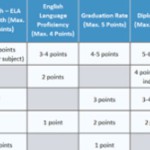Diagnosing the Education System’s Health
While disaster in Providence schools receives a deserved proportion of Rhode Islanders’ attention, Tim Benson of the Heartland Institute suggests that we shouldn’t lose sight of problems across the whole state:
Results from the latest version of the National Assessment of Educational Progress (NAEP) test—also known as the Nation’s Report Card—have been released, and Rhode Island’s scores are not good.
Only 35 percent of fourth graders tested “proficient” in reading, while just 40 percent tested proficient in mathematics in 2019. These math scores were a decline from 2017. For eighth graders, just 35 percent were proficient in reading, and only 29 percent were proficient in math. Both of these results were also a decline from 2017, with reading scores being significantly down. When accounting for demographic differences across students throughout the state and control for race, ethnicity, special education status, income level, etc., Rhode Island’s scores are even worse.
Benson offers this as an introduction to his proposed solution, which is to expand the state’s tax credit scholarship program, whereby businesses receive tax credits for donating to scholarships for disadvantaged students. Lifting the cap on that program, opening it up to non-corporate donors, and adding provisions to provide certainty to scholarship recipients would all be great changes, but of itself, that solution is wholly inadequate to Rhode Island’s problem.
One local man here in Tiverton has been on a Facebook mission to find out what went wrong with Rhode Island public schools. There isn’t a single reason things got to their current state, and there won’t be a single fix. The challenges are cultural, they’re institutional, and they’re deep. Asking what went wrong is like looking at a lonely, obese, alcoholic smoker in late middle age whose house looks like it ought to be condemned for all the hazards and asking why his health is poor.
We need broad public policy reforms that open up doors for a wide variety of individualized education plans for students as part of a cultural shift in our understanding of ourselves and of government.




